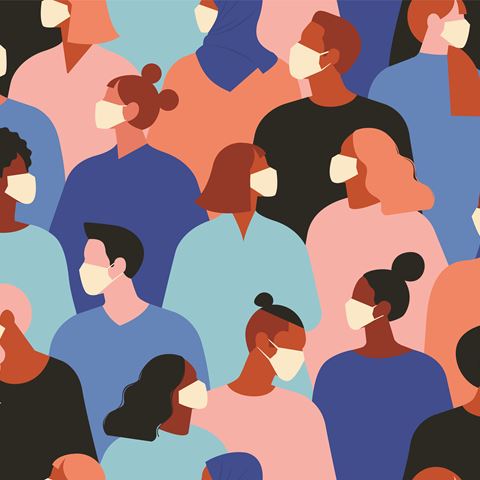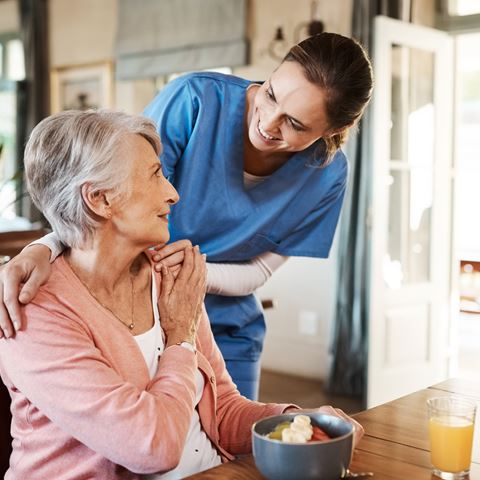By Harriet Smith, RD, HRS Communications
Introduction
Early on in the COVID-19 pandemic, the virus was described as ‘a great equaliser’ since celebrities, politicians, and even members of the royal family fell ill with it. In addition to the direct impact of the virus on individuals, it’s important to recognise the wider impact of the national lockdown rules on the lives of many they seek to protect.
Certain groups, including the over-70s and those with specific long term health conditions are classified as ‘clinically vulnerable’ to the effects of contracting COVID-19 (1). For several months during the spring, these groups were advised to ‘shield’, staying at home indefinitely and avoiding interaction with anyone from outside their household.
At the time of writing, shielding advice is no longer in force, although the ‘clinically vulnerable’ are still being advised to limit their interactions with others and stay at home “as much as possible” (2). In this article, we speak to people from different vulnerable sectors of society to hear about their personal experiences of lockdown.
Older People
Julia Thorne is 82-years-old and lives in Surrey. Due to her age and a pre-existing condition, she received a letter from the government advising her to shield for 12 weeks due to COVID-19. Julia told us about her experience of shielding and how it affected her routine
“I couldn’t go out to buy groceries, and I really enjoy food and like being able to make spontaneous choices while I’m at the shops, so having to plan ahead for my meals was an adjustment, as was embracing online food deliveries – something I’ve never used before.
Even though supermarkets were offering vulnerable people priority online delivery slots, it was so difficult to get a slot at first. I wasn’t able to get one for several weeks. I was fortunate in that I had relatives and neighbours who kindly offered to get groceries and prescriptions on my behalf to tide me over.
I was afraid to go outside as I had a heart attack just before lockdown so I knew how important it was to exercise, but I wasn’t sure if I was allowed to because of shielding. That did cause me quite a lot of worry and stress.”
The social element of grocery shopping is one that many people may take for granted, but the experience – and consequently the loss of it – can have a profound impact.
“It’s all taken a lot of getting used to – when the Tesco delivery driver arrived I tried to invite him in for a cup of tea, completely forgetting about the social distancing guidelines! Getting food delivered became something I really looked forward to as it meant an opportunity to chat with someone and feel a little less lonely. Going out to get groceries is a real highlight of my week as it gets me out of the house and allows me to catch up with people I know in the local area, so that did have a big impact on me.”
Julia described to us how lockdown affected not only how she accessed food, but the types of foods available to her.
“I wasn’t able to get my usual food choices so I had to be accommodating. I gratefully accepted food substitutes from the online delivery or from my friends and family. I’ve also been trying to do batch cooking, making stews and soups that I make my shop last longer.”
Living with a Disability
People with disabilities generally have more healthcare needs and are more likely to be in poorer health than those without disabilities (3). Access to support services has been disrupted during lockdown, with data from Northern Ireland demonstrating that 57% of disabled people had experienced disruption accessing food or medicine, with additional people concerned about future access (4).
We spoke with Thomas Andrews, a double amputee in his 60s who uses a wheelchair. Just prior to lockdown, Thomas had moved to a new area and didn’t have a local support network nearby. He tells us how his local community rallied round to help him.
“I moved to Shrewsbury just before lockdown, having lived in London for 48 years. When lockdown hit, I didn’t know any of my neighbours and hadn’t had a chance to make many friends in my new area. Initially, I felt nervous about how lockdown would affect me as I live alone and am disabled. It caused quite a bit of stress and I felt lonely and isolated. I wasn’t able to get any online supermarket shopping slots, so I became worried about how I would cope.”
Volunteer groups have been instrumental in connecting vulnerable individuals with the resources they need during the pandemic, with technology playing a huge part in facilitating this connection, as Thomas describes.
“After a few days of struggling to cope, I confided in a friend, although she lived many hours away in Surrey. She posted in some local COVID volunteer groups that she found on Facebook, and we were both blown away by the response from kind locals. Before I knew it, I received a phone call from the head volunteer who called to find out more about me and my requirements. He arranged a rota where locals took it in turns to shop for my groceries and pick up my prescriptions. They also offered regular phone calls to lift my spirits.”
Community actions have worked to minimise the impact of COVID-19 on vulnerable people, and have ensured that people like Thomas have not suffered alone.
“My neighbours also rallied around, with one person arranging regular vegetable boxes delivered to my door, and another elderly couple providing (and continuing to provide) a delicious weekly roast dinner and pudding on a Sunday. I really noticed the community spirit during lockdown, and I’m grateful for the friendships that I’ve formed as a result. Every Thursday, I would look forward to joining my neighbours in our gardens as we joined together in a round of applause (or a clatter of dustbin lids and pots and pans, in my case!), as we remembered the people working tirelessly on the frontline.”
Living With a Long-term Health Condition
As the NHS diverted resources to treat escalating numbers of COVID-19 patients, planned care for patients with pre-existing healthcare needs was suspended. In addition, many patients with conditions such as diabetes, heart disease, and cancer declined treatment during the pandemic, citing concerns about contracting the virus or breaking lockdown (5).
We spoke with Dr Georgina Morgan, a retired GP and Associate Medical Director living with Stage 4 appendix cancer. On government advice, Georgina shielded during lockdown. She describes how accessing food became difficult and required a change in routine and cooking habits, as well as reliance on friends and delivery services.
“I was shielding alongside my family (my husband and 2 kids). Tesco priority slots were an absolute godsend as we could get weekly online deliveries, but we were limited to 88 items per delivery, which isn’t a lot when you normally cook from scratch, make fresh juices and have hungry teenagers. We had to be creative in our purchases!
Friends also shopped for us and helped out by dropping off food parcels. Making 3 meals a day, 7 days a week was hard work and it did feel like we were constantly meal prepping, cooking and clearing away. We got the kids involved and tried new recipes. Food became so important and it was the main thing we looked forward to during lockdown; it provided some much-needed variety and structure to our days. The novelty of being able to pop to the supermarket still hasn’t worn off!”

